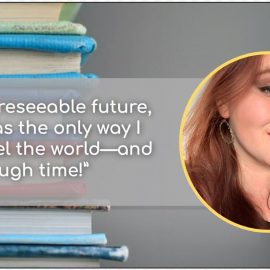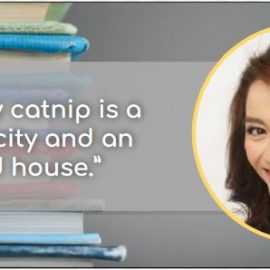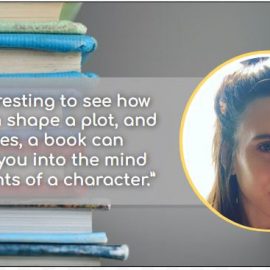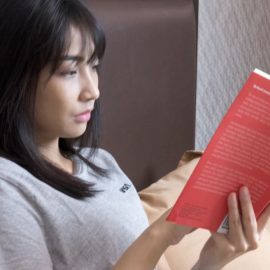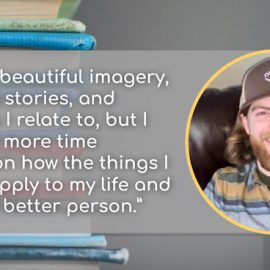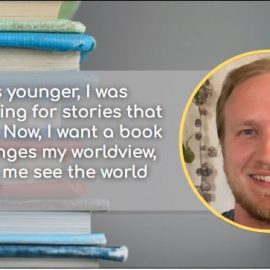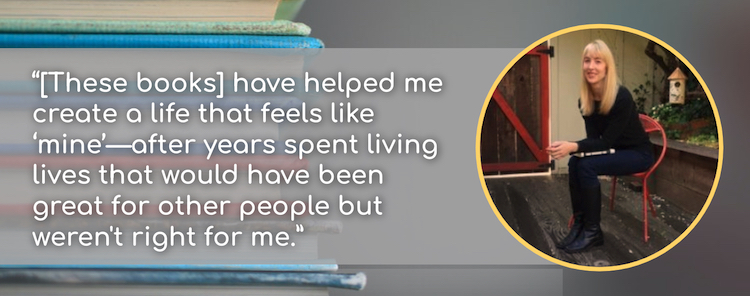
What do Joan Didion, Benjamin Franklin, and Mindy Kaling have in common? What kind of book does Amanda buddy read with her mom?
Based on the California coast, Amanda is Shortform’s managing editor. We interviewed her recently to learn a bit about her relationship with books.
Our Interview With Amanda
Whether it’s for work or leisure, Amanda reads voraciously. Here’s what she had to say about her reading habits and insights.
What kind of work do you do at Shortform?
I’m Shortform’s managing editor. Basically, I’m one of many people who helps ensure we have fantastic book guides to publish each week!
What’s your favorite book and why?
I can’t pick a favorite, but ones I’ve enjoyed lately—or reread often—include A Field Guide to Getting Lost, Persuasion, The Invention of Nature, How to Be an Antiracist, The White Album, The Metaphysical Club, and The Biggest Bluff. I gravitate toward contemplative—some people would call it “slow”—nonfiction that examines a facet of life I’m unfamiliar with in minute detail, then pulls back to reveal the universality of its themes. Those books that answer the “big questions” by zeroing in on a single person, place, event, or pattern.
What are you reading these days?
I typically have two or three books going at once. Recently, I finished Bad Blood, I Capture the Castle, and Magpie Murders. Now I’m reading 25 Million Sparks and rereading Caste. Next up are Hamnet, Here for It, and The Anatomy of a Moment.
If you could have a dinner party with any three authors—dead or alive—who would they be and why?
Joan Didion, Benjamin Franklin, and Mindy Kaling—for obvious reasons?!
What’s your favorite genre? Why does it intrigue you?
I try to sample all genres, but general nonfiction and mystery are my go-to comfort reads. They seem like an odd pairing, but they’re comforting for the same reasons: When I’m not feeling adventurous, I can reach for something in these genres and know exactly what to expect. For nonfiction, as long as I’m interested in the topic and the book’s not horribly written, it’s a good bet—I can usually tell if I’m going to like it just based on the info on the book jacket. And the conventions of classic mysteries are so dependable that, in a world that can feel uncertain and unjust, I can be sure that—by the end of the mystery—truth will be discovered, justice will be served, and all the pesky loose ends will be tied up.
What’s your favorite way to read a book?
Because my prime reading time is at the end of the day—when I don’t want to stare at a screen—I usually read a physical copy. But I’d like to get into audiobooks so I can listen while I walk!
What books do you think everyone should read in their lifetime?
Caste and Bad Feminist.
How have your reading tastes changed over the years?
I got into mysteries only in the last few years. I was bored and grabbed a random book from my late grandmother’s collection, and it was a Dorothy L. Sayers mystery. I ended up reading the whole Wimsey series and moved on to other writers of the era—Agatha Christie, Ngaio Marsh. My mom, too, sometimes reads mysteries, so this is a fun way for us to do buddy reads. We just finished Anthony Horowitz’s Magpie Murders together.
Was there a specific book that sparked your love of reading?
I was a reluctant reader when I was a kid, but I made exceptions for Pippi Longstocking, Alice in Wonderland, A Wrinkle in Time, and The Baby-Sitters Club. Later, in middle school, I became a little obsessed with all things Narnia and Doctor Dolittle. As an adult, it was probably Harry Potter that made me realize I was still capable of being completely absorbed by a book.
Do you have any guilty-pleasure books?
Not really a guilty pleasure, but I love to read books with mouth-watering descriptions of food.
Have any books you’ve read caused you to make any life changes or to develop any habits?
Designing Your Life, Your Money or Your Life, Tiny Habits, and Deep Work all have helped me create a life that feels like “mine”—after years spent living lives that would have been great for other people but weren’t right for me.
Are there any books you had to read for Shortform that you thought you wouldn’t like and ended up loving?
I worked on The Big Short as an editor, and I spent the next month accosting people with unsolicited explanations of mortgage-backed securities, credit default swaps, and collateralized debt obligations. I thought it was fascinating.
What are your favorite books in the Shortform library and why?
Superforecasting, Biased, On Writing, The Shock Doctrine, Caste, The Righteous Mind, The Design of Everyday Things, and Thinking in Bets are high on the list. I like books that challenge me to see something from a new-to-me perspective.
Amanda’s Recommended Reading List
- A Field Guide to Getting Lost
- Persuasion
- The Invention of Nature
- How to Be an Antiracist
- The Metaphysical Club
- Caste
- Bad Feminist
- Biased
- The Shock Doctrine
- Thinking in Bets
About the Series
At Shortform, we want to give our employees names and faces so you can get to know the people who make the magic happen. That’s why we’re doing the Shortform Reads series, where we interview our employees and share their thoughts and opinions. You can check out more employee interviews here.

